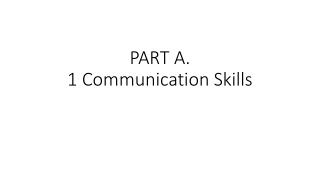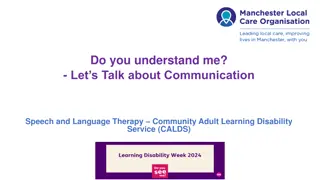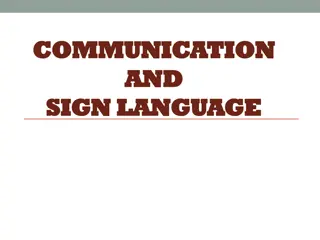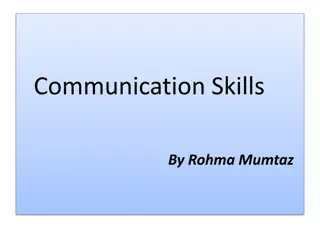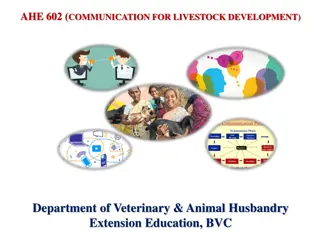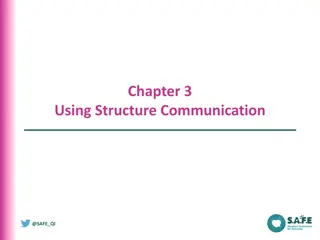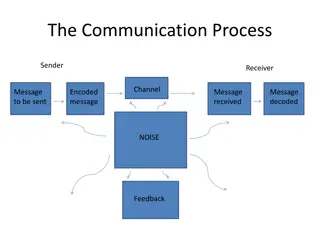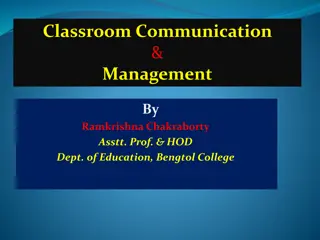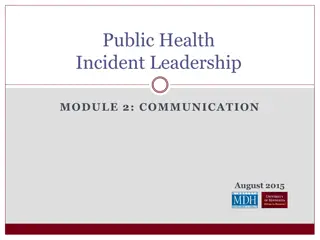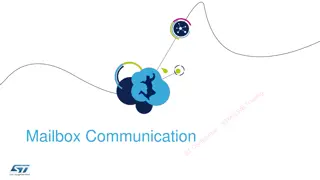Understanding Development Communication: Key Insights
Key issues regarding Development Communication (DevComm) are highlighted, emphasizing the distinction between communications and communication processes. Professional expertise, research, interdisciplinary knowledge, and stakeholder engagement are crucial for successful DevComm initiatives. The importance of tailored strategies and being issue-focused is emphasized.
Download Presentation

Please find below an Image/Link to download the presentation.
The content on the website is provided AS IS for your information and personal use only. It may not be sold, licensed, or shared on other websites without obtaining consent from the author. Download presentation by click this link. If you encounter any issues during the download, it is possible that the publisher has removed the file from their server.
E N D
Presentation Transcript
Summary Issues Julius Mbeya
Key issues about Devcomm CD/ C4D/ CFSC can be used interchangeably Communications and communication are not the same thing. The plural form refers mainly to activities and products, including information technologies, media products, and services (the Internet, satellites, broadcasts, and so forth). The singular form, on the other hand, usually refers to the process of communication, emphasizing its dialogical and analytical functions rather than its informative nature and media products. There is a sharp difference between everyday communication and professional communication. A person who communicates well is not necessarily a person who can make effective and professional use of communication. A professional specialist understands relevant theories and practices and is capable of designing effective strategies that draw from the full range of communication approaches and methods to achieve intended objectives. (development) communication Julius Mbeya-MS-TCDC Devcom
There is a significant difference between DC and other types of communication such as Corporate communication, internal communication or public Realations. Each has a different scope and requires specific knowledge and skills to be performed effectively. Expertise in one area of communication is not sufficient to ensure results if applied in another area. The main scope and functions of development communication are not exclusively about communicating information and messages, but also involve engaging stakeholders and assessing the situation. Communication is not only about selling ideas. Development communication include analytical aspect as well as a dialogical one intended to open public spaces where perceptions, opinions, and knowledge of relevant stakeholders can be aired and assessed.
DC initiatives can never be successful unless proper communication research is conducted before deciding on the strategy. (CBA as opposed to CNA. More effective at the start but can be integrated in ongoing projects as well. To be effective in their work, DC specialists need to have a specific and in-depth knowledge of the theory and practical applications of the discipline. However, it s vital to be educated in the basic principles and practices of other interrelated disciplines, such as anthropology, marketing, sociology, ethnography, psychology, adult education, and social research. Acquaintance with participatory research methods and techniques, M&E tools, and basics principles of strategy design are indispensible. A good professional should also have the right attitude toward people, being empathic and willing to listen and to facilitate dialogue in order to elicit and incorporate stakeholders perceptions and opinions. Consistently be issue-focused, rather than institution-focused.
DC support can only be as effective as the project itself. The best designed communication strategy will fail if the overall objectives of the project are not properly determined, do not enjoy a broad consensus from stakeholders, or if the activities are not implemented in a satisfactory manner. When called upon to provide solutions to problems that were not clearly investigated and defined, or to support objectives that are disconnected from the political and social reality on the ground, the ideal solution is to carry out field research or a communication-based assessment to probe key issues, constraints, and feasible options. Short term, quick fix solutions undermine the basic foundations of development communication making results disappointing over the long term. Development communication is not exclusively about behavior change. The areas of intervention and the applications of development communication extend beyond the traditional notion of behavior change to include, among other things, probing socioeconomic and political factors, identifying priorities, assessing risks and opportunities, empowering people, strengthening institutions, and promoting social change within complex cultural and political environments. Julius Mbeya-MS-TCDC Devcom
That associated with behavior change could be ascribed to a number of factors, such as its application communication programmes. These kinds of interventions are among the most visible but DC can be applied to non-communication programmes. development communication is often Media and IT are not the backbone of DC. The value- added of DC occurs before media and information and communication technologies (ICTs) are even considered. Their application, comes at a later stage, and their impact is greatly affected by the communication work done in the research phase.
Remain wary of one-size-fits-all solutions that appear to solve all problems by using media products - contextualize. Participatory communication approaches are not the same thing and should not be used interchangeably, but they can be used together, as their functions are often complementary, especially during the research phase. Remain faithful to principles of inter-personal communication and DC principles. approaches and participatory
Ahsante sana Merci beaucoup Thank you Julius Mbeya-MS-TCDC Devcom


